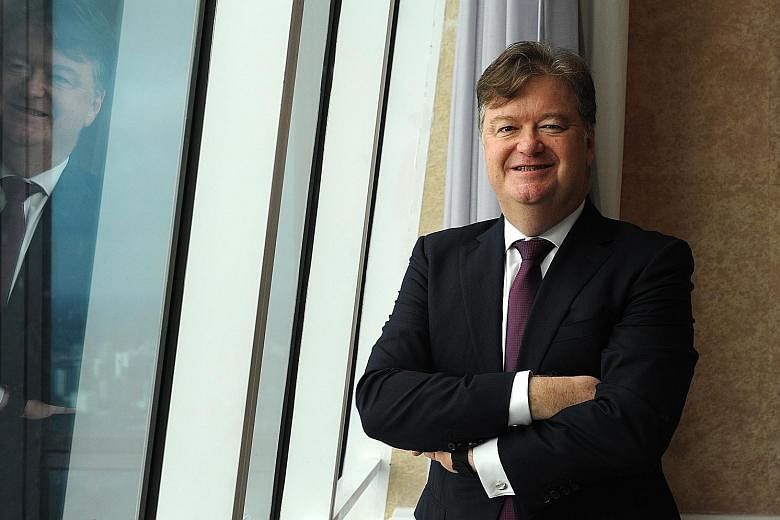The Sentosa Cove property scene had been in a lull for some years when City Developments (CDL) stunned the market in December 2014 with a novel way of monetising its assets there.
The developer struck a deal with United States investment giant Blackstone and Malaysia's CIMB Bank in which the investors bought into current and future cash flows of CDL's hotel, retail and residential mixed development on the island, Quayside Collection.
The structure, dubbed a profit participation securities (PPS) investment platform, was unusual for CDL, which has generally been regarded as a traditional "brick-and- mortar" property firm.
But exactly a year later, in December last year, CDL announced its second PPS platform, this time with three office assets. And the company continues to work on several potential PPS structures, chief executive Grant Kelley told The Straits Times on Wednesday.
Mr Kelley, a fast-talking, self-assured Australian, is no doubt behind that shift in strategy.
He is an old hand at private equity. Before his appointment at CDL in January 2014, he was co-head of Asia-Pacific at Apollo Global Management and led its real estate investment activities in the region.
From 2004 to 2008, he was chief executive of Colony Capital Asia before founding a real estate investment firm which was acquired by Apollo in 2010.
The PPS platform has helped CDL in terms of front-end profit - when the asset is sold to the vehicle - and back-end profit, when certain targets are met.
Any of the company's stabilised assets could be candidates for another PPS, which market observers expect could come by the end of this year. "Many developers have done divestment or asset-value unlocking closer to the end of the year, before the financial year- end," noted Mr Ong Kian Lin, RHB head of Singapore research.
CDL's spanking new South Beach mixed-use development, which opened in stages last year, could be a candidate, given that its offices are 98 per cent leased, retail is more than 50 per cent leased and the hotel is to be rebranded as JW Marriott Singapore. "It is reaching a stabilised state," said Mr Ong.
While Mr Kelley would not say what type of assets could come under the next PPS platform, the general concept for such a deal is that the asset has to be income-producing in a sector poised to grow.
"We want our investors to be able to participate in a win-win situation... We want those to be very long-term relationships," he said.
Since the deal in Sentosa Cove, rental stream at the residences has grown, with 187 of 200 available units leased out. The retail portion, Quayside Isle, is 99 per cent leased, while the hotel enjoys "healthy occupancy and rates".
Similarly, the offices put up under the second PPS structure - the Central Mall office tower, 7 and 9 Tampines Grande and Manulife Centre - are not necessarily affected by the oversupply of offices in the Marina Bay, Raffles Place and Tanjong Pagar area, he added.
But the asset market has come under some pressure, which makes it a more difficult environment in which to execute a PPS, Mr Kelley noted. "That may change next year or 2018... But if the asset market doesn't recover, we are not going to force ourselves to do one."
What about a real estate investment trust (Reit)? Mr Kelley replied: "What works well for a Reit is typically something that has very high yields on cost... (But) if you look at the Reit market, there has been a major discount in the last six to 12 months. A lot of assets that Reits want may become available, or Reits themselves may become available for acquisition because the yields are becoming cheap.
"So I don't think it's the right timing to go into a Reit."
CDL has even considered a residential Reit with its large portfolio of luxury properties, but rental yields here would be too low for that, he added. "But one area where there could be Reit potential is industrial, as Singapore has positioned itself well as a logistics capital for Asia."
Given Mr Kelley's experience in private equity in the hospitality sector - in 2005, he led Colony's buyout of Raffles Holdings' entire hotel portfolio, including Raffles Hotel here - he could be thinking to further unlock value from the Millennium & Copthorne (M&C) properties.
Mr Kelley did not comment on acquisition targets but noted that the main challenge at present is to optimise the operating business, given disruptive events such as terrorism and economic downtown and secular challenges like Airbnb.
Overall, CDL has a strategy of 5-5-5 - to have $5 billion in the five overseas markets of Australia, Britain, China, Japan and the United States; $5 billion in funds under management, both in five years - or by 2018. It now has $2.6 billion in funds under management.
So, with capital recycled from the group's fund management activities, CDL intends to grow overseas. It announced the acquisition of its first office building redevelopment property in the UK for £37.4 million (S$73.4 million) earlier this month.
But even with plans for diversification, CDL remains a Singapore company, Mr Kelley said. "We stay vigilant with Singapore. If a good land parcel or en bloc opportunity is available we look at it very carefully. But we stay disciplined on pricing.
"Singapore is still our home and the core of operations, providing 67 per cent of our earnings before interest, depreciation and amortisation. It's our historical franchise."


